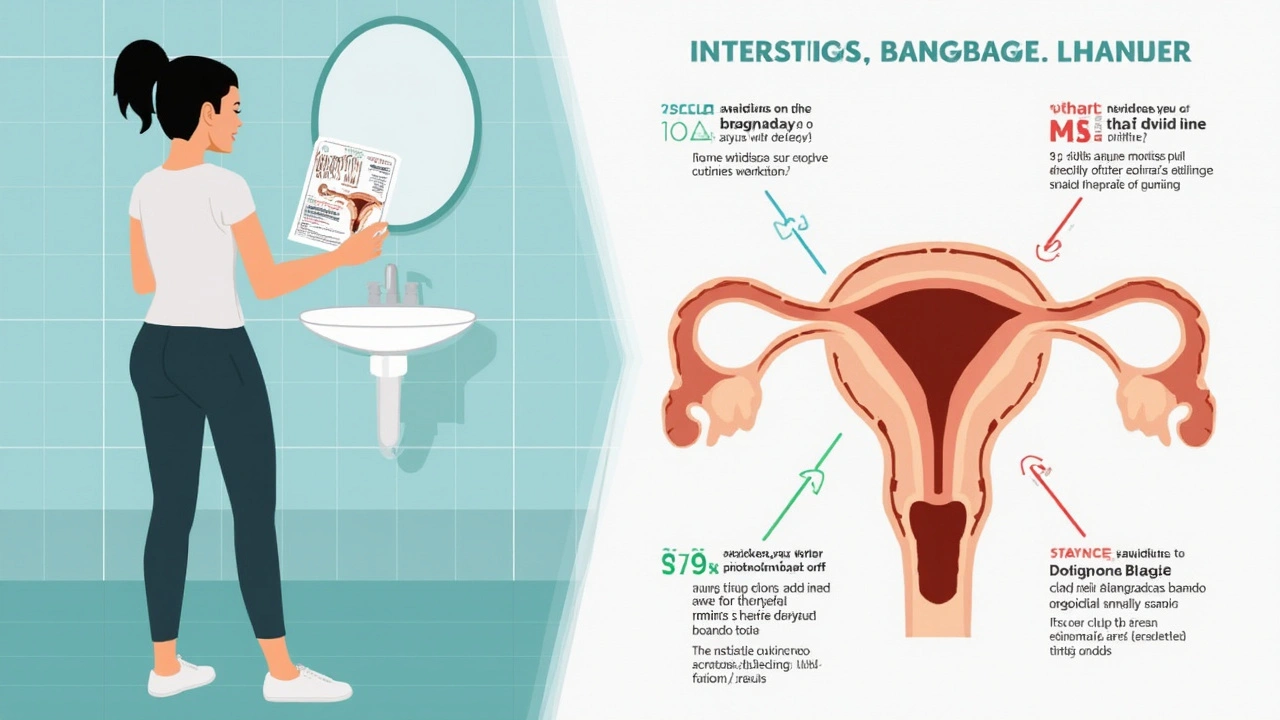I was once stopped mid-sentence by my friend’s text: “Why does it burn every time I pee—do I have an infection... again?” If you've dealt with burning sensations down there, you know how it hijacks your focus, your comfort, and sometimes even your confidence. A lot of people immediately blame a garden-variety UTI or yeast infection. But what if you keep getting negative test results, plus some baffling symptoms like pelvic pain, discomfort after certain foods, and constant pressure on your bladder? These aren’t just throwaway complaints—they can be clues pointing toward a lesser-known culprit: interstitial cystitis. The weird reality is, vaginal burning isn’t just about infections. It’s part of a bigger, frustrating medical mystery that still stumps plenty of doctors and, honestly, people like me until I had to help a close family member hunt for answers.
What Is Interstitial Cystitis and How Is It Different from Typical Infections?
Interstitial cystitis, often called IC or bladder pain syndrome, sounds technical, but it just means that your bladder wall isn’t happy—it’s irritated, sometimes even damaged, and sends pain signals in all directions. Around 3 to 8 million women in the U.S. have it (that’s nearly one in 25 women by some counts), though men and kids can get it, too. Here’s the kicker: IC feels a lot like a stubborn UTI, but without the bacteria. So if you walk into your clinic complaining about burning, pelvic pain, and a desperate need to pee every 30 minutes, you’ll likely be handed a urine cup. If those cultures come back clean—even after repeated tests—and nothing is fixing the symptoms, it’s time to think outside the infection box.
With IC, the burning sensation isn’t restricted to just peeing. It can show up before, during, or after urination. It often spreads beyond the bladder—into the vagina, vulva, or entire pelvic floor. Compare that to a standard UTI, where the problem clears up fast after antibiotics and doesn’t usually cause months of lingering pain. IC also comes with weird food triggers: ever notice things getting worse after coffee, citrus, spicy foods, or even tomatoes? That’s your bladder’s hyperactive nerves reacting to the world. Vaginal yeast infections and bacterial vaginosis can also cause rawness and burning, but the pattern is different (you’ll usually get itching, odd discharge, or that telltale strong smell). IC symptoms, on the other hand, often show up during periods of stress or after activities like sex, which can confuse the situation even more.
Doctors still aren’t sure what the root cause is—some blame immune issues, others point to a thinning bladder lining, and some think it’s a nervous system overdrive that makes every minor irritation feel major. But one thing they agree on: IC is a real physical disorder, not just “in your head.”
Why Does Interstitial Cystitis Cause Vaginal Burning?
The burning connection is all about anatomy and nerves. The bladder sits right next to the vagina, separated by just a thin muscular wall. When the bladder lining is inflamed in IC, pain signals can radiate out, confusing both your body and your brain. It’s like when you hit your elbow and feel tingling all the way down your arm—nerves share the same traffic lines. This is called “cross-talk,” and it’s especially strong in the pelvis, where pain from one organ often spills over to the next.
The nerves that sense pain and touch in the bladder are very close neighbors with those in the vaginal wall and vulva. That’s why burning caused by IC can be felt as rawness or stinging in places that seem unrelated at first glance. Sometimes, the burning gets worse during your period, times of high stress, or even after a glass of red wine. Hormonal changes, autoimmune reactions, or even chronic pelvic floor tension all play into this nerve overload.
To complicate things further, researchers at Wake Forest University reported that over 80% of their female patients with IC also experienced some type of vulvodynia—chronic pain at the vaginal entrance. There’s even a name for it: “co-morbid pain syndrome.” The numbers show this is more common than many think, and not just a fluke. As all this irritation keeps your nerves in overdrive, burning sensations stick around, even if there’s no sign of infection at all.

When Burning Means Something Else—How to Tell the Difference
If you or someone you care about has chronic vaginal burning, the first instinct is to check for infections. Absolutely do that—nobody wants to miss a simple fix. But if test after test comes up negative, or burning seems to flare up after stress, certain foods, periods, or sexual activity, it’s time to look at the bigger picture. Chart your symptoms in a notebook or app: when is the burning at its worst? Do you also have bladder pressure, pelvic pain, or need to pee constantly?
Doctors will usually check for everything from common yeast infections to sexually transmitted infections (STIs). Sometimes, menopause and low estrogen can cause vaginal burning due to thinner, drier tissues—especially if you’re over 40. Allergic reactions (to products like scented wipes, soaps, new laundry detergents), dietary irritants, or tight clothing can irritate sensitive skin as well.
But here’s a telltale IC clue: if burning is linked to urgency, bladder pain, or a feeling like you can never get “empty,” your doctor should look into a diagnosis of IC. Urodynamic tests or a cystoscopy (where a tiny camera looks at your bladder lining) might be used to rule it in or out.
| Condition | Main Symptom | Bladder Pain | Vaginal Burning | Triggers |
|---|---|---|---|---|
| UTI | Burning with urination | Yes | Sometimes | Bacteria |
| Yeast Infection | Itching, discharge | No | Yes (itch/burn) | Imbalance |
| Interstitial Cystitis | Pelvic pain, pressure | Yes (chronic) | Yes (radiates) | Foods, stress |
See? If burning comes and goes with different bodily triggers, it’s time to ask your doctor about IC. And don’t ignore your gut—especially if you notice a connection between discomfort and things like coffee, spicy meals, or even long stressful periods at work or home. It’s not all in your head.
Practical Tips for Getting Relief While Seeking Treatment
Living with IC and vaginal burning feels like a never-ending test of patience. While you’re chasing down a diagnosis (which can take months, if not longer), there are ways to grab some comfort in daily life. Start with your diet: research published in "Urology" in 2023 showed that up to 70% of IC sufferers said certain foods and drinks—not just the typical coffee and soda, but also chocolate, vinegar, citrus fruits, and tomatoes—made things much worse. Keep a food diary for two weeks and see what flares or eases your symptoms. Avoiding irritants gives your bladder a break and may lessen burning moments.
- Switch to plain, unscented soaps (for body and laundry) and avoid harsh wipes or sprays.
- Try using a sitz bath: lukewarm water for 10-15 minutes may ease discomfort—a pediatrician friend recommended this for my daughter, and it worked wonders.
- Loose, breathable cotton underwear can cut down rubbing and irritation.
- Ask your doctor about topical lidocaine for extreme burning (used sparingly, under supervision).
- Stay hydrated, but avoid caffeine and acidic drinks like juice and soda.
- Pacing your activities helps—if exercise makes it worse, swap for gentle walks or stretch breaks instead of hardcore routines.
- Physical therapy, especially pelvic floor therapy, can calm nerves and muscles that might be feeding into the pain.
- For some, antihistamines (like hydroxyzine) and prescribed medications like pentosan polysulfate can help the bladder wall recover, but these should only be used under a doctor’s care.
Remember, you shouldn’t have to tough this out alone. Support groups online (especially those focused on chronic pelvic pain or IC) can offer a lot of comfort and practical hacks from people who’ve been down this exact road.

When to Get Help and What to Expect from Doctors
If your symptoms are interfering with your quality of life—disrupting sleep, causing anxiety, wrecking relationships, or leading to school or work absences—get a referral to a urologist or gynecologist who specializes in pelvic pain. This isn’t just a matter of discomfort. Untreated IC and chronic burning can fuel more nerve pain (central sensitization), affecting everything from mood to digestion.
Here’s what usually happens at the doctor: after routine urine and swab tests, if infections are ruled out, you may get a bladder diary to log your symptoms. You might go through an exam that checks for pelvic tenderness and muscle spasms. Bladder instillations (where soothing medications are put directly in the bladder), oral meds, and even bladder retraining exercises are potential next steps.
- Keep asking questions if your doctor seems stumped—bring a written list of your symptoms, triggers, and everything you’ve already tried.
- Don’t give up after one appointment. IC is a diagnosis made after ruling out other issues, so it can take months (or more) to confirm.
- If you’re not getting answers, ask to see a pelvic pain specialist—it’s their job to untangle tough cases.
One thing to remember: the journey with IC isn’t a straight line. There are flare-ups, quiet spells, setbacks, and good weeks. Many people see big progress over time once they find the right combination of diet, therapy, symptom management, and support.
If you’re reading this and feeling alone, trust me, you’re not. Every symptom is a message from your body, not a failure on your part. There’s help, answers, and better days ahead.


11 Comments
Jacob Hamblin
July 18, 2025 AT 06:10This was a really insightful read, especially because the connection between vaginal burning and interstitial cystitis (IC) isn’t commonly discussed. It’s surprising how many people might be dealing with overlapping symptoms without really understanding the link. The piece did a great job breaking down the symptoms and giving practical advice for those affected.
What I found particularly helpful was the part about differentiating between the two conditions, as that can be confusing for patients. The inclusion of statistics also helps put the issue into perspective. I wonder how current treatments are evolving, though? Are there promising new therapies on the horizon for those who experience these symptoms?
Overall, a well-researched article that demystifies a complex issue. I appreciate how it’s approachable without being too clinical.
TRICIA TUCKER
July 20, 2025 AT 16:47Totally agree with the previous comment! I personally know someone who has struggled with these symptoms for years, and this article would have been a godsend back then. The way it explains what people can do immediately to find relief is super practical.
It’s so important to understand that these issues are often interconnected, not just random separate problems. Really cool that the article brings awareness in such a clear-cut manner.
Also, the advice given is something many can actually start using right away instead of feeling helpless. Can anyone here share their experiences with coping strategies? What worked best for you?
Andrea Mathias
July 21, 2025 AT 22:00Honestly, I find it quite irritating how many times these sorts of symptoms get brushed off like they’re no big deal. This article is a little ray of sunshine in the otherwise dim medical literature on women’s health issues that are often trivialized or misdiagnosed. The overlap between vaginal burning and IC is not just medically fascinating but also extremely frustrating for patients.
Sometimes, I suspect the healthcare system is more bothered by a complex case than the actual patient. If only docs would read articles like this and actually listen instead of just prescribing antibiotics for the umpteenth time!
Anyway, props to the author for putting together something that doesn’t sugarcoat the struggle and gives people something tangible to work with. Let’s hope this kind of education keeps spreading like wildfire.
Jacob Hamblin
July 25, 2025 AT 03:08Absolutely, Andrea. The medical community definitely needs to improve how they handle such complex symptomology. Patient experience must be taken more seriously. There’s a lot of disconnect when symptoms are dismissed without proper exploration.
What I like is how the article emphasizes practical tips for comfort alongside medical insights. It’s not just about understanding but also managing day-to-day effects. That balance is crucial for improving quality of life.
Also, I think there should be more encouragement for patients to advocate for themselves, informed by articles like this one.
Dave Tu
July 27, 2025 AT 17:10While the article is informative, I question whether it oversimplifies what is actually a complex set of conditions. The linkage between vaginal burning and interstitial cystitis is not universally experienced, and surely, there are myriad other causes at play that deserve exploration.
Furthermore, given the variability of symptoms, it might lead some to self-diagnose incorrectly, potentially delaying proper treatment.
I’d have preferred a more nuanced approach with clear guidance to see a healthcare professional for definitive diagnostics rather than implying symptom overlap as a conclusive diagnosis in itself.
Johnna Sutton
July 30, 2025 AT 06:32i swear this kinda crap always makes me wonder who’s really controlling healthcare agendas?? focusing on symptoms like vaginal burning is just the tip of some big iceberg they dont want us to see. interstitial cystitis? they want us chasing these diagnoses while the real truths are hidden. btw my cousin had the same symptoms and was pushed aside like she was imagining it, typical!
this article is a tiny piece but i’m watching closely if it opens eyes or just quiets folks down. dont fall for the soothing talk, dig deeper behind the scenes.
Vinay Keragodi
August 3, 2025 AT 08:33Interesting perspectives from everyone. I’m curious—does anyone here know how lifestyle changes might affect these symptoms? Like diet or stress management playing a role in alleviating the discomfort?
I read somewhere that avoiding certain irritants or caffeine can help with interstitial cystitis symptoms. Has anyone tried alternative therapies or supplements that showed promise?
From my understanding, the nervous system’s involvement in chronic pain syndromes might explain why these symptoms overlap, but more research is definitely needed. Would love to hear others’ experiences as well!
TRICIA TUCKER
August 5, 2025 AT 18:33Hey Vinay, yes! Diet definitely plays a role. Many people with IC find relief by eliminating bladder irritants like caffeine, alcohol, spicy foods, and acidic fruits. Stress is also a huge trigger for flare-ups, so mindfulness and relaxation techniques can really help.
On top of that, some swear by pelvic floor physical therapy and gentle exercise. It takes trial and error, but there are ways to manage symptoms without feeling totally trapped.
Glad you brought this up because it expands the conversation beyond just symptoms to actual living with these conditions day-to-day.
Anil Karwal
August 8, 2025 AT 13:17Agree with much that’s been said here. Chronic symptoms like these can be so draining mentally and physically. Patients often feel isolated. Articles like this help by shedding light and validating those experiences.
That said, everyone’s journey is different. What helps one person might not help another. The key is persistent exploration and working closely with knowledgeable healthcare providers.
I appreciate how balanced this article is—neither alarmist nor dismissive. Hopefully more awareness leads to better support systems for sufferers everywhere.
Millsaps Mcquiston
August 12, 2025 AT 17:03From my experience, it’s frustrating how often symptoms like vaginal burning get ignored or misinterpreted. Many medical professionals don’t seem to connect the dots to conditions like interstitial cystitis until it’s advanced.
I think education for both practitioners and patients is absolutely key. This article does a solid job in that regard, breaking down complicated topics into understandable language.
People suffering shouldn’t have to feel they’re alone or that their symptoms are all in their head. Hopefully, posts like this spark conversation and encourage earlier diagnosis and treatment.
michael klinger
August 16, 2025 AT 16:00Honestly, I can’t help but wonder if some of the symptom overlap could be conflated with psychological factors or other underlying conditions that get swept under the rug in favor of neat medical labels.
Is there enough evidence to definitively link vaginal burning and IC or are we just patching over deeper issues with a superficial connection? The mixed formality in the article reflects some uncertainty which should be acknowledged more.
I’d encourage a broader look into patient histories before settling on these diagnoses, and to maintain a critical eye on emerging data.